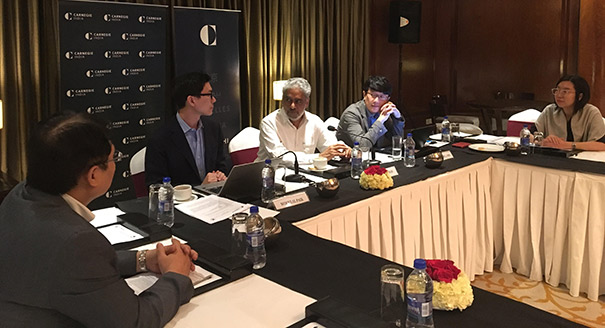Registration
You will receive an email confirming your registration.
The Korean Peninsula is a large source of volatility in the geopolitical situation of East Asia. The proliferation of nuclear weapons as well as militarization in the peninsula can potentially affect all states in the vicinity, including India.
Carnegie India, in partnership with the Embassy of the Republic of Korea, hosted Wooyeal Paik, assistant professor at the department of Political Science and International Studies, Yonsei University, and Young Chul Cho, head of the Jimmy Carter School of International Studies at Chonbuk National University, to lead the discussion on the possibility of Korean unification and the prospects for enhanced India-South Korea relations. The discussion was chaired by C. Raja Mohan, director of Carnegie India.
Discussion Highlights
- Shadow of History: Participants discussed the shared history of Northeast Asian states. They said that the division of the Korean Peninsula and the Cold War intensified hostilities in the region. Participants stated that domestic politics of Northeast Asian nations are faced with a rise in nationalism that divides the region, even as globalization demands integration. These two opposing trends, they explained, make North East Asian states uncertain about their choice of regional order.
- Northeast Asia’s Geostrategic Context in Flux: Participants discussed the significance of the current geopolitical recalibration, which they said is driven by a rising China and the relative decline of U.S. commitment in the region. They stated that the new dynamics between China and the United States indicate that change is imminent in Northeast Asia. This, they argued, has prompted some East Asian analysts to think outside existing prisms and consider new approaches toward nuclear weapons possession by South Korea or Japan. Participants also discussed South Korea’s incentives to diversify its partnerships in addition to its traditional reliance on the United States. This, they stated, has caused Seoul to debate the necessity to develop new partnerships with new middle powers such as India, which is highlighted in South Korea’s new “Look South policy.”
- Prospects for Korean Unification: Participants discussed the South Korean government’s new peace initiative toward unification efforts in the peninsula under President Moon Jae-in. They posited two major ways of realizing unification. The first was “unification by the law,” based on the premise of “one nation one state.” This, according to them, would entail the complete reformation of the current order, even requiring coercive force to implement it. The second route, they suggested, was through “de-facto unification,” which involved normalization and reconciliation between both states. The participants also discussed the idea that India could play a role in facilitating and promoting a peaceful Northeast Asian order. However, some argued that India had little leverage when dealing with North Korea, and should not meddle in the Peninsula.
- Challenges to Induce Change in Pyongyang: Participants agreed that unification in the peninsula had several obstacles, including North Korean resistance to normalization attempts. One major hurdle, some stated, was the Western image of North Korean leadership as irrational, which precluded any outreach efforts to Pyongyang. They suggested that the regime was interested in rectifying this image of North Korea. Moreover, participants highlighted the fact that the South Korean youth is opposed to unification. Participants cautioned that a mere change in North Korea’s leadership would not necessarily change its strategic priorities. They also emphasized North Korea’s economic reliance on China, as well as Beijing’s unwillingness to pressure Pyongyang, as significant obstacles to normalization. Finally, participants said that the decline in U.S. interest and involvement in facilitating the six-party talks might incentivize North Korea to adopt a more aggressive posture.
- Opportunities for Convergence Between Seoul and New Delhi: Participants highlighted that India and South Korea have traditionally both been inward oriented. They said that both countries have been looking to form partnerships with other middle powers, and referred to the Japan-India partnership as a model for New Delhi and Seoul to develop partnerships in third spaces. Participants argued that India’s Act East policy and South Korea’s Look South policy could potentially converge. They also highlighted that while the two countries have established strong economic relations, they are yet to impact to their strategic partnership. They suggested increasing the number of dialogues and exchanges across various government and civil society levels between the countries. Participants recommended that India develop sophisticated ways to engage the Korean peninsula and manage balanced relations with all the actors in the region.
The event summary was prepared by Rhea Menon and Deepakshi Rawat, interns at Carnegie India.
